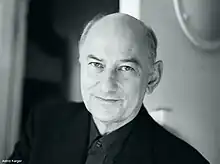Hugues Dufourt
Hugues Dufourt (French: [dyfuʁ]) is a French composer and philosopher associated with the spectral school of composition. Born in Lyon on September 28, 1943, Dufourt studied piano and composition at the Geneva Conservatory.

Dufourt became co-director of the Ensemble l'Itinéraire in 1973 and founded CRISS (Collectif de Recherche Instrumentale et de Synthèse Sonore—Instrumental and Sound Synthesis Research Collective) in 1977. It was for CRISS that he composed in 1978–79 his best-known work, Saturne, for percussion, wind ensemble, and electronics—a work inspired by Erwin Panofsky's analysis of etchings by Albrecht Dürer.[1][2] His work Burning Bright (2014) also received five votes in a 2017 Classic Voice poll of the greatest works of art music by living composers since 2000.[3]
Many of Dufourt's larger works have been inspired by the paintings of artists as various as Brueghel, Giorgione, Rembrandt, Poussin, Guardi, Goya, and Pollock.[4]
References
- Castanet 2001.
- Pasler 2011, 227.
- Anon. 2017.
- Pasler 2011, 198, 227.
Sources
- Anon. 2017. "Presse Release: A Music Referendum". Classic Voice, no. 212 (January): (accessed 7 April 2020).
- Castanet, Pierre Albert. 2001."Dufourt, Hugues". The New Grove Dictionary of Music and Musicians, second edition, edited by Stanley Sadie and John Tyrrell. London: Macmillan.
- Pasler, Jann. 2011. "Hugues Dufourt's 'Manifesto of the Music of Our Times': Narratives Without History in L'Afrique and L'Asie d'après Tiepolo". Perspectives of New Music 49, no. 2 (Summer): 198–231.
External links
- Biography, works, recordings, Editions Henry Lemoine
- "Hugues Dufourt (biography, works, resources)" (in French and English). IRCAM.
